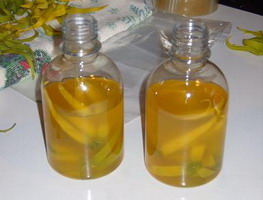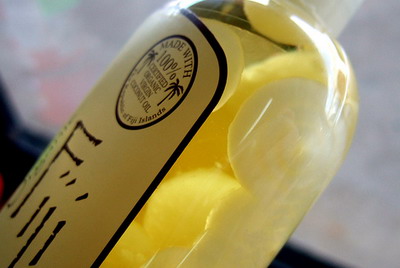Coconut Oil
Walking along a Southern California beach on a sundrenched summer afternoon, you smell the sweet fragrance of coconut floating on the ocean air.
Coconuts do not grow in Southern California. Explanation: sun worshippers know how a coconut nourishes, protects, and preserves the moisture in their
skin. All the popular girls around lifeguard tower 2 select only tanning products with SPF 30 and coconut oil, and many of the veteran surfer girls down near the jetty protect their berry-brown skin from sun and salt water with fresh virgin coconut oil, nothing added. Most people know about coconut oil from its use in the world’s most popular sun-tanning oils and lotions. Everybody ought to learn about its benefits for all kinds of difficult skin conditions.
Coconut oil ranks number one on Nature’s list of best remedies for skin and hair. You simply cannot find another essential oil more potent or practical for protecting, healing, nourishing, and beautifying your skin.
Coconut Bio-Chemistry 101
Count the coconut among Nature’s nearly perfect foods. Nutrient-rich and easily absorbed by hungry skin cells, coconut oil contains a number of natural medicinal acids; makers of commercial skin care products use synthetic versions of these acids in their products, but the man-made versions come nowhere close to healing powers of Nature’s own.
You probably recognize some of the names—stearic acid, common in lotions, shampoos, and conditioners, or lauric acid, common in skincare products and acne medications. The list includes nearly a dozen potent medicines.
More specifically, coconut oil is exceptionally rich in…
- Fatty acids—Lauric Acid, Caprylic Acid, and Capric Acid: All three fatty acids have strong anti-microbial and anti-bacterial properties, protecting skin against infection and speeding recovery from occasional break-outs. Many dermatologists now recommend coconut oil for acne patients in search of an all-natural alternative to anti-biotics and harsh topical treatments. They similarly recommend acne patients switch to coconut oil for cooking, because these three fatty acids boost immunity to infection.
- Saturated fats—triglycerides: Applied to your skin, “medium chain fatty acids” help your complexion retain its natural moisture, so that it looks and feels smooth. Keeping skin moisturized, triglycerides prevent breakdown of natural collagens, and they promote healthy metabolism in developing skin cells.
- Vitamin E—One of Nature’s most potent anti-oxidants. In your own backyard, you recognize “the oxidation reaction” as rust on nails, apples turning brown if you leave them exposed to air too long, or the chemical reaction bleach triggers as it whitens fabric. In your body, oxidation releases free radicals which attack vulnerable cells, changing the structure of their DNA and making them susceptible to pathogens, toxins, and carcinogens.
Anti-oxidants promote the body’s natural elimination of free radicals, protecting cells and promoting healthy growth and replication. Translation: your skin does not crack, peel, wrinkle, or age.
Coconut Oil on Defense
Waxed, shaved, or chemically depilated, freshly smoothed legs and bikini lines can develop nasty, ugly, sometimes even painful red bumps. After cleaning and conditioning tender skin with toner, liberally apply coconut oil and prevent the bumps. After deep-cleansing your face, restore its moisture and put-up a strong defense against acne, liberally applying coconut oil. After shampooing and conditioning your hair, prevent dandruff and protect your scalp against irritation, working coconut oil into the roots of your hair.
On a sunny afternoon, more than 100,000 people may crowd a southern California beach, bringing with them all kinds of insidious bacteria, fungi, and microscopic parasites. Literally an ounce of prevention, coconut oil protects the popular girls and surfer girls from tourists’ athlete’s foot, ringworm, shingles, and dermatitis. Although candida, better known as a “yeast infection,” seldom attacks skin, it can. Dermatologistsl debate whether or not one person can transmit candida to another; locals prefer to protect themselves. Coconut oil is kryptonite to candida, stopping its growth and transmission. Enhanced with UV protection, coconut oil protects against sunburn and some coconut aficionados insist it promotes dark tanning. All that and all-over soft, supple skin, too!

